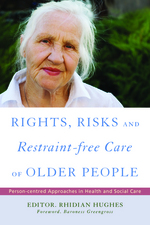 Rhidian Hughes is the author of Rights, Risk and Restraint-Free Care of Older People: Person-Centred Approaches in Health and Social Care, published by Jessica Kingsley Publishers. Rhidian Hughes is a Visiting Senior Lecturer at Guy’s, King’s and St Thomas’ School of Medicine and Visiting Senior Researcher at Institute of Gerontology, King’s College London.
Rhidian Hughes is the author of Rights, Risk and Restraint-Free Care of Older People: Person-Centred Approaches in Health and Social Care, published by Jessica Kingsley Publishers. Rhidian Hughes is a Visiting Senior Lecturer at Guy’s, King’s and St Thomas’ School of Medicine and Visiting Senior Researcher at Institute of Gerontology, King’s College London.
How did you first become interested in the field of gerontology and restraint in particular?
Before going to work in palliative care I read for my Doctorate in social policy. The main focus of my work at that time was on finding ways to improve end of life care for older people.
I then went to work for the Commission for Social Care Inspection during its existence between 2004 and 2009. The focus of my work changed as it required me to take a whole system look at how care is planned and commissioned as well as how it is delivered and experienced by people using services. Many of my studies included a focus on older people, including people with dementia and complex needs. We were charged to follow up a Government Health Committee report on the neglect and abuse of older people and a specific recommendation which asked the Commission to publish its findings on restraint. Preparing this report for the Commission sparked my interest in the use of restraint and this edited volume.
Your new book takes an international look at the topic across a range of health and care services. What do you think are the main differences between the UK in comparison with other countries in Europe or North America are in relation to restraint?
Thanks to some early pioneers, the United States was the first country to take a long hard look at the use of restraint and to develop a number of innovative restraint reduction and eradication approaches. Many of the principles underpinning these approaches remain current today. Progress in other countries has followed, although at a different pace. Arguably the UK has lagged behind other countries in the attention afforded to this topic and the lack of domestic research has been criticised, a point made in the book. What is positive however is that the UK is beginning to take seriously the need to develop our evidence base on the abuse and neglect of older people, and important studies are underway.
What do you think are the main challenges facing those working with older people?
We all need to be challenging any use of restraint. It is a practice that merely contains issues at particular points in time. Restraint does nothing to address the underlying causes of people’s behaviour. The book underlines the importance of taking a person-centred approach to enable the perspectives and needs of older people to be addressed, so that the precursors to behaviour that give rise to the use of restraint are identified and acted upon early enough. To achieve this vision requires the right complement of well trained staff, good leaders and services that put people at the centre of their care. Getting these basics right will enable us to make some important inroads to improving older people’s experiences of care.
What are you reading at the moment?
True Tales of American Life edited by Paul Auster a fascinating collection of short stories all revolving around anecdotes that were written by listeners to a radio show in the states. I am also dipping into Pennine Way because, one evening in the pub, I committed to walk it.